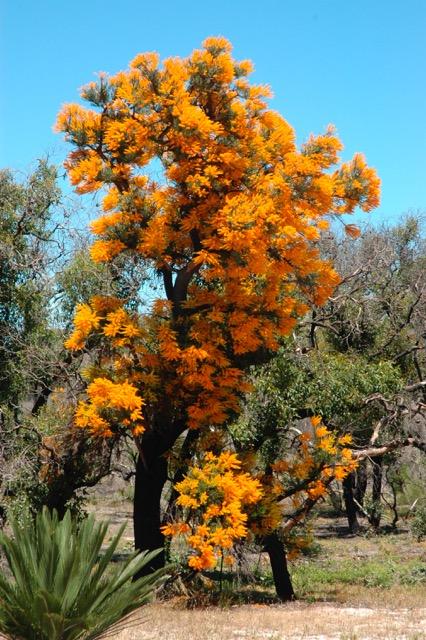The kwongan has revealed the dirty secrets of the plant kingdom to University of Montreal and University of Western Australia scientists. The kwongan is a type of bushland that is only found in South-West Australia and is exceptionally rich in terms of biodiversity, despite existing on some of the most infertile soils in the world. Its unique nature enabled the researchers to discover that plants use an amazing variety of root strategies to obtain nutrients from these poor soils. "In nature, plants growing in infertile land all use almost exactly the same above-ground strategy: they produce very tough leaves that survive for several years. However, up until now the contrasting diversity of what they were doing underground with their roots was unknown," explained Professor Etienne Laliberté.

Kwongan. Credit: Etienne Laliberté
Indeed, the findings show that the kwongan contains almost all the plant kingdom's root adaptations, on soils so infertile that any form of agriculture is impossible without adding a phenomenal amount of fertilizer. "Scientists believe that natural selection should have favoured a single, particularly efficient root strategy for acquiring nutrients, given the extreme infertility of the land," Laliberté said. "However, contrary to what we see in the foliage, where many different species of plant have adopted the same, efficient strategy of gaining nutrients with their leaves, there is no single miracle solution when it comes to roots in poor soil. Plants living next to one another can use completely different strategies and have just as much success. This came as a surprise to us."
The general perception of the Australian Outback as being a bland, empty void couldn't be further from the truth. "Some plants form symbiotic root relations with fungi and some with bacteria, while capture and digest insects for the nutrients that they contain. Moreover, another broad group of species exude organic compounds that increase nutrient availability," said Dr. Graham Zemunik. "The Australian kwongan is one of Earth's plant diversity hotspots, just like tropical rainforests." The research team is in fact supporting an initiative to have the kwongan recognized as a UNESCO World Heritage site for this reason.
The findings, like the kwongan as a whole, are of global importance. "Ecosystems all around the world are being altered at an alarming rate. In order to protect biodiversity as best as we possibly can, we need to understand how these systems work. To achieve that goal, our study shows that it's important to go beyond what's immediately visible to study what nature has hidden below ground," Dr. Zemunik said.
Citation : Zemunik G., Lambers H., Turner B.L. et E. Laliberté (2015). Diversity of plant nutrient-acquisition strategies increases during long-term ecosystem development. Nature Plants.